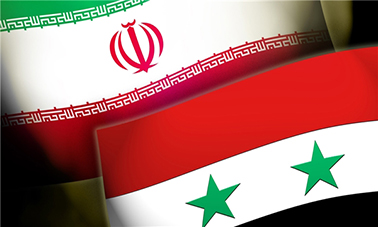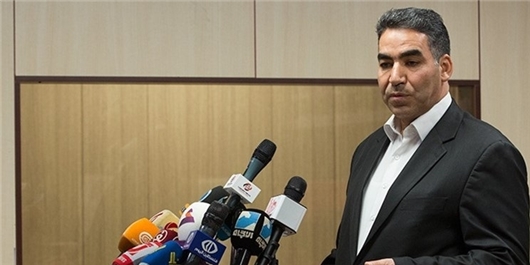
Iran, Syria Mulling over Duty-Free Trade


Seyyed Ahmad, speaking in a joint meeting between the Iranian and Syrian economic agents in Iranian Chamber of Cooperative in Tehran on Monday, stressed that the Syrian government is committed to expansion of trade relations with Iran, inviting Iranian economic agents to invest in Syria.
He noted that there are 4% duties between the two countries, saying that the two sides are planning to remove all customs duties altogether in the near future.
He said that Syria has now entered its reconstruction period, adding that Syria’s reconstruction needs billions of dollars.
The Syrian charge de affairs further called for enhancing level of economic cooperation between Iran Syria to the same level as the current bilateral political relations. He estimated the current level of Iran-Syria bilateral trade to be at $ 200 million, describing it very low that needs to get much higher.
He further referred to the barriers to development of bilateral trade relations, saying that financing the exports and opening letters of credit at each other‘s banks using local currencies are obstacles that need to be resolved.
Seyyed Ahmad went on to say that Syria and Iran are both under foreign sanctions, adding the two countries have the right to hold bilateral meeting on removing barriers to their trade.
Late in February, Iran's First Vice President Eshaq Jahangiri headed a high-ranking delegation to Syria where he hailed the victories of the Arab country in fighting terrorists, and reassured that Tehran will keep supporting Damascus in the reconstruction phase after the war.
Jahangiri said that Iran is honored to be spearheading the anti-terror campaign in the region while felicitating the Syrian government and nation for their achievements in the fight against terrorism.
He made the remarks in a meeting between high-ranking delegations of Iran and Syria, co-chaired by him and Syrian Prime Minister Imad Khamis in Damascus.
Jahangiri added that Iran would stand by the Syrian government and nation in the reconstruction plans of the war-stricken country, saying, "Syria has entered a new phase and efforts should be made toward the country's reconstruction."
He noted that Iran is among the countries in the region and across the world that enjoy high capabilities to build power plants and pledged to help Syria in this regard.
In a related front, early on December 30, Iranian Minister of Road and Urban Development Mohammad Eslami said that Iran and Syria have sealed a strategic agreement.
Eslami invited all Iranian business people to accompany the delegation for talks on the reconstruction process in the Arab country.
He made the announcement at a meeting of Iranian business people with the Syrian Minister of Economy and Foreign Trade Mohammad Samer al-Khalil held at Iran’s Chamber of Commerce.
The Iranian minister said that with the implementation of a strategic economic agreement between Iran and Syria, the condition is ripe for sustainable development of economic and trade relations between the two sides.
He maintained that the meeting will make it easier for a stronger presence of Iranian private sector in Syria, highlighting the need for the participation of Iranian business people in Syria’s projects following the restoration of peace and stability to the Arab country.
He further underscored the participation of the Iranian private sector in Syria’s reconstruction process, referring to plans for taking different measures this time through joint investments.
Senior Iranian officials have repeatedly voiced the Islamic Republic's readiness to help Syria with reconstruction of the war-ravaged country.
In early October, Iran signed an agreement to build a 540-megawatt (MW) gas fired power plant in Syria’s coastal city of Lattakia.
At the request of Damascus, Iran has also been providing military advisory assistance to the Syrian government forces in its fight against foreign-backed Takfiri terrorists.


Trump weighs using $2 billion in CHIPS Act funding for critical minerals

Codelco cuts 2025 copper forecast after El Teniente mine collapse

Electra converts debt, launches $30M raise to jumpstart stalled cobalt refinery

Barrick’s Reko Diq in line for $410M ADB backing

Abcourt readies Sleeping Giant mill to pour first gold since 2014

Nevada army depot to serve as base for first US strategic minerals stockpile

SQM boosts lithium supply plans as prices flick higher

Viridis unveils 200Mt initial reserve for Brazil rare earth project

Tailings could meet much of US critical mineral demand – study

Kyrgyzstan kicks off underground gold mining at Kumtor

Kyrgyzstan kicks off underground gold mining at Kumtor

KoBold Metals granted lithium exploration rights in Congo

Freeport Indonesia to wrap up Gresik plant repairs by early September

Energy Fuels soars on Vulcan Elements partnership

Northern Dynasty sticks to proposal in battle to lift Pebble mine veto

Giustra-backed mining firm teams up with informal miners in Colombia

Critical Metals signs agreement to supply rare earth to US government-funded facility

China extends rare earth controls to imported material

Galan Lithium proceeds with $13M financing for Argentina project

Kyrgyzstan kicks off underground gold mining at Kumtor

Freeport Indonesia to wrap up Gresik plant repairs by early September

Energy Fuels soars on Vulcan Elements partnership

Northern Dynasty sticks to proposal in battle to lift Pebble mine veto

Giustra-backed mining firm teams up with informal miners in Colombia

Critical Metals signs agreement to supply rare earth to US government-funded facility

China extends rare earth controls to imported material

Galan Lithium proceeds with $13M financing for Argentina project

Silver price touches $39 as market weighs rate cut outlook

















